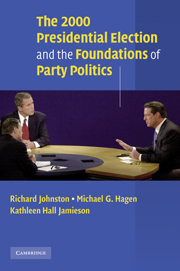Book contents
- Frontmatter
- Contents
- Acknowledgments
- 1 Introduction
- 2 The Evolution of Vote Intentions
- 3 The Landscape
- 4 Ads and News: The Campaign as a Natural Experiment
- 5 The Economy, Clinton, and the First Phase
- 6 Candidate Traits and the Second Phase
- 7 Social Security and the Third Phase
- 8 Conclusions
- Appendix
- References
- Index
5 - The Economy, Clinton, and the First Phase
Published online by Cambridge University Press: 28 May 2010
- Frontmatter
- Contents
- Acknowledgments
- 1 Introduction
- 2 The Evolution of Vote Intentions
- 3 The Landscape
- 4 Ads and News: The Campaign as a Natural Experiment
- 5 The Economy, Clinton, and the First Phase
- 6 Candidate Traits and the Second Phase
- 7 Social Security and the Third Phase
- 8 Conclusions
- Appendix
- References
- Index
Summary
Why did it matter that Gore lost the ad war? According to standard forecasting models, he was supposed to win handily. The failure of the forecasts has provoked debate about the models and speculation about what, if anything, was special about 2000. This chapter shows that Al Gore ought to have benefited from the robust economy, as forecasting models predicted. The first phase of the general campaign exemplifies what might have happened. Assessments of the economy were as positive as they had been in years. Voters continued to credit the incumbent administration for good times. This combination of factors helped push Al Gore well in front after the conventions. The nominating conventions helped Gore, in that economic perceptions were initially disordered: Democrats were much less optimistic about the economy than Republicans were. But the conventions sorted out key differences, and made the economy a potential major plus for the Democrats. The campaign itself did not alter perceptions further, although the stock market did temporarily. But Gore took no credit for the economy, to the point that his advertisements mentioned it not once. And toward the end, the impact of economic judgments may just have faded away.
The 2000 election may be the exception that proves the rule, first articulated by Gelman and King (1993) and elaborated by Campbell (2000), that the campaign is necessary to remind voters of the correct economic judgment and so realize the predictions made by forecasting models.
- Type
- Chapter
- Information
- Publisher: Cambridge University PressPrint publication year: 2004

